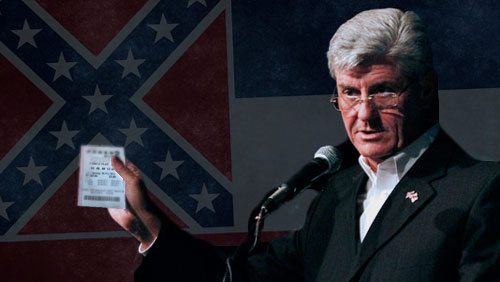The state of Mississippi is finally warming up to the idea of taking a chance on lottery to boost its flagging revenue after shunning the game for almost three decades.  Mississippi Gov. Phil Bryant has finally made a 180 degree turn from his earlier position that the idea of lottery is a “silly notion.” Now singing a different tune, Bryant told The Clarion-Ledger that he’s now willing to discuss a state lottery in Mississippi. “I would be open to a general discussion regarding a statewide lottery,” the governor said in a written statement. “However, I would be opposed to this particular revenue being dedicated to specific expenses, such as public education. Our children’s future should not be left to a game of chance.” Bryant’s recent comment proved to be significant especially since he was the first Mississippi governor to have an open mind on the lottery idea for nearly 30 years. Ever since former Gov. Ray Mabus’ ill-fated push for one in 1990 helped get him un-elected, any effort to create a lottery has faced a certain gubernatorial veto and was, therefore, moot. Talks of establishing a state lottery in Mississippi intensified as the state finds ways to boost its coffers. It has also seen a number of its residents scurry across the state borders to buy lottery tickets. For Lt. Gov. Tate Reeves, his decision would depend on whether a lottery would bring in new money or take money from sales taxes and casinos. “The economic question that must be answered: Would a state lottery add to the economic pie or would it simply shift Mississippians’ disposable income from one outlet to another? … Would any perceived increase in revenue from a lottery be offset by reductions in sales tax collections and gaming receipts?” Texas Lottery Announces Record $5B In Fiscal 2016 Sales If there’s one state which Mississippi should set as a model for its lottery, perhaps Gov. Bryant should ask his counterpart in Texas. The Star Telegram reported that Texas Lottery has topped more than $5 billion in annual sales for the first time since the various games began in 1992. Texas Lottery Executive Director Gary Grief attributed the historic revenue to the scratch-off tickets, which generated $3.72 billion and the $1.5 billion Powerball in January. Since the Texas Lottery began, $25 billion has been generated in revenue for the state, including more than $19 billion for Texas public education and more than $66 million to Texas veterans, lottery records show. For the fiscal year, Texas Lottery said that a record of $1.39 billion went to the state coffers.
Mississippi Gov. Phil Bryant has finally made a 180 degree turn from his earlier position that the idea of lottery is a “silly notion.” Now singing a different tune, Bryant told The Clarion-Ledger that he’s now willing to discuss a state lottery in Mississippi. “I would be open to a general discussion regarding a statewide lottery,” the governor said in a written statement. “However, I would be opposed to this particular revenue being dedicated to specific expenses, such as public education. Our children’s future should not be left to a game of chance.” Bryant’s recent comment proved to be significant especially since he was the first Mississippi governor to have an open mind on the lottery idea for nearly 30 years. Ever since former Gov. Ray Mabus’ ill-fated push for one in 1990 helped get him un-elected, any effort to create a lottery has faced a certain gubernatorial veto and was, therefore, moot. Talks of establishing a state lottery in Mississippi intensified as the state finds ways to boost its coffers. It has also seen a number of its residents scurry across the state borders to buy lottery tickets. For Lt. Gov. Tate Reeves, his decision would depend on whether a lottery would bring in new money or take money from sales taxes and casinos. “The economic question that must be answered: Would a state lottery add to the economic pie or would it simply shift Mississippians’ disposable income from one outlet to another? … Would any perceived increase in revenue from a lottery be offset by reductions in sales tax collections and gaming receipts?” Texas Lottery Announces Record $5B In Fiscal 2016 Sales If there’s one state which Mississippi should set as a model for its lottery, perhaps Gov. Bryant should ask his counterpart in Texas. The Star Telegram reported that Texas Lottery has topped more than $5 billion in annual sales for the first time since the various games began in 1992. Texas Lottery Executive Director Gary Grief attributed the historic revenue to the scratch-off tickets, which generated $3.72 billion and the $1.5 billion Powerball in January. Since the Texas Lottery began, $25 billion has been generated in revenue for the state, including more than $19 billion for Texas public education and more than $66 million to Texas veterans, lottery records show. For the fiscal year, Texas Lottery said that a record of $1.39 billion went to the state coffers.